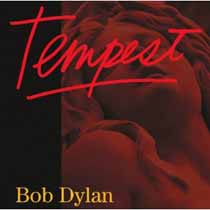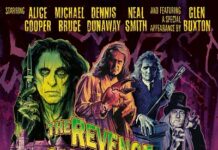And so the seemingly never-ending merriment of Bob Dylan continues. Fifty years since his debut and 35 studio albums later, the 71-year-old bard bestows us with Tempest, replete with 10 new songs, teeming with bits of country, blues, swing, ragtime and Dylan’s gravelly narration. A good-timey sounding record with infectious rhythms and serious, borderline morbid undertones, Tempest treads confidently on the notion that Bob Dylan is a national treasure who can do whatever the hell strikes his fancy — heavily decorated, a songwriter with no rivals, a band leader without a care in the world, nothing to lose, endless respect to gain.
The important thing to remember when you’re listening to Tempest is that it’s not so much about the music — well-played, fairly repetitious and even-note syncopated in its attack — or the much-beloved-much-scrutinized voice as it is about the lyrics, undoubtedly Dylan’s strongest suit. You have to wonder, after 50 years of experiencing and seeing more than most mortals, what earth the man has to say. Apparently, everything from love to God to death to Leonardo DeCaprio is on Dylan’s mind these days.
On “Duquesne Whistle,” a swinging romp that opens the disc, Dylan gets help from Grateful Dead lyricist Robert Hunter on the words. You can almost imagine Jerry Garcia strumming along, but things slowly get darker on down the road. You want to think “Soon After Midnight” is this lovely little love song until Dylan mutters lines like, “Two-timing Slim, who’s ever heard of him, I’ll drag his corpse through the mud…” The band loosens their load on “Narrow Way” as a nasally, mashed-potato-filled mouthful of down ‘n dirty words come tumbling out for over seven minutes.
Of course, that’s nothing as the tunes keep coming, effectively becoming grittier, rootsier, longer. “Early Roman Kings” glides on the coattails of Muddy Waters’ “Mannish Boy” with a wink and a snarl. The title track is an Anglo waltz that sounds the death knell of Titanic for nearly 15 minutes before moving on to John Lennon in “Roll On, John.” Yeah, you could say the material is at once ham-fisted, abrupt, angry, loquacious, allegorical and everything you probably dig about Bob Dylan. Some critics are calling foul because of the lifted lines and pop culture references; others think it’s Dylan at his most brilliant.
I’ll stand outside the circle and simply cite it as an impressive achievement for a guy who proved himself long ago. I’m not sure it ranks up there with Blonde On Blonde or Blood On The Tracks, but it certainly fits the mold Dylan has filled since Time Out Of Mind — raw, solid, self-indulgent canvases the songsmith bleeds over to stay in motion. Indeed, the day Bob Dylan retires from making records and traveling the countryside croaking out his music is the day he stops breathing. You can bet your sweet Tempest on that.
~ Shawn Perry




















